Multi-cueing: teaching the habits of poor readers
27 Replies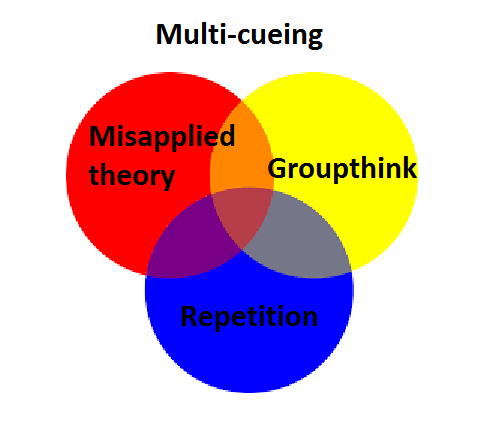
I’m mentioned in The Age newspaper today because as usual I’ve been talking to anyone who will listen about the need for more and better phonemic awareness and phonics teaching for beginning and struggling readers and spellers.
I was a bit sad that the article started off saying that “the ‘reading wars’ have been reignited”, as I’m not interested in war with anyone. I just want teachers to be given the skills and resources they need to teach all but a tiny minority of children to read and spell, confidently and well, on their first attempt. But I guess in the media it has to bleed to lead.
It was lovely that the article discussed the successful use of an explicit, synthetic phonics program with the Preps at Westgarth P.S., one of my local schools. Nothing is so powerful as a good example.
Christmas writing
2 Replies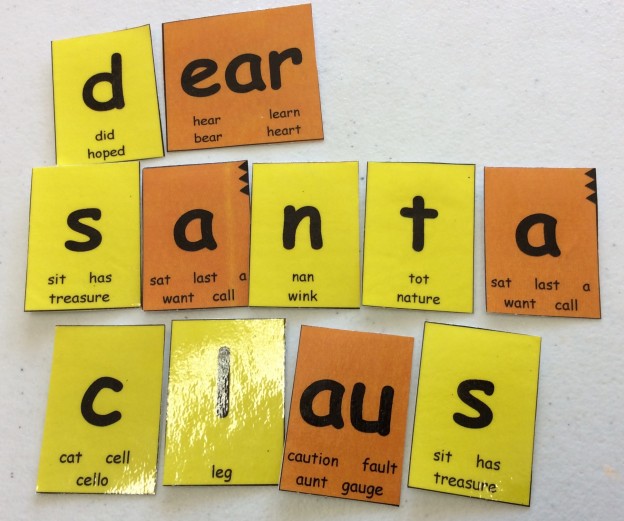
Little kids (and quite a few bigger ones) are often keen at this time of year to write Christmas lists, letters to Santa, cards or do other seasonally-adjusted writing.
They are often less enthusiastic about continuing to do structured spelling work.
It’s the silly season, so fair enough. It’s great to find a writing task they’re still keen to do, in between all their parties, concerts and swimming.
I often give up on the structured spelling work at this point of the year and just go with the silly season writing, aiming to give kids enough guidance for them to sound out all the words they want to write, while making sure I prevent spelling mistakes.
The first encounter with a written word matters, and spelling it correctly maximises your chances of getting it right again next time.
There’s no need to give up on sounding out words for this activity, and revert to visual copying or reciting letter names.
Instead, you can give kids the spellings they need for any words they can’t spell independently, and ask them to build these words before writing them. (more…)
Made-up words in children’s books
4 Replies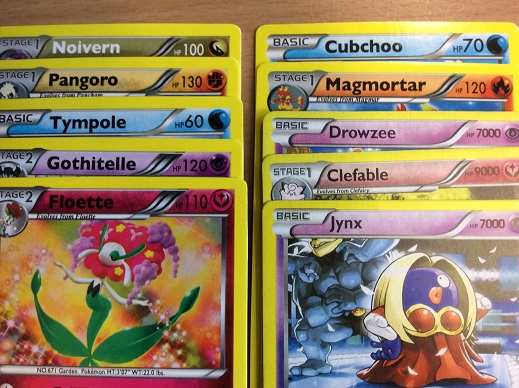
Desmond Digby, the illustrator of one of my favourite children's books, Bottersnikes and Gumbles, recently died. Sad face.
At age seven, I got my first library fine from the mobile library visiting my tiny rural school because I couldn't bear to give Bottersnikes and Gumbles back.
In honour of Desmond Digby, because it's the Queen's Birthday Long Weekend (how brillig!), and just in case there's anyone out there muttering "but they don't MEAN anything" about the pseudoword spelling test I posted the other day, I thought I would post a nice long list of some of the many pseudowords in kids' popular culture.
Such words are also interesting to discuss with anyone who thinks the dictionary contains all the words children need to be able to read, or that reading and spelling involve memorisation of words, not encoding and decoding. How can we read or spell these words, if that's the case?
A pseudoword becomes a word when someone attaches a meaning to it, and in kids' popular culture (as well as popular culture for adults, think Westeros) this happens all the time.
Pokemon, Yu Gi Oh and Konami swap cards are all the rage at a school I visit, so yesterday I was given a lovely tour of a collection (not literature, but still a child's book) by a little chap earnestly intent on sounding out names like the ones in the picture below, because to him they really, truly were Real Words:
What are English morphemes, and why do they matter for spelling?
9 Replies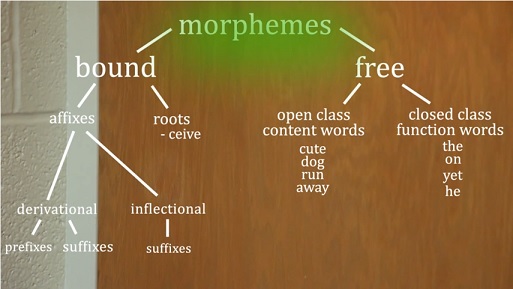
At the start of each year, to the delight of Aussie word nerds, the Macquarie Dictionary announces which new words have come into common usage in the previous twelve months, and gives us all a People's Choice vote on the Word of the Year.
Of this year's crop, I enjoyed "flappity", "mansplain", "voluntold", "job stopper", "bamboo ceiling", "wikiwash", "mandal", "facekini", "normcore", "decision fatigue", "doge", "compassionista", "precariat", "girlie man", "lifehacking" and "dog surfing", but having had to deal with more politicians, planning bureaucrats and property developers than is really recommended for one's good mental hygiene, would give the gong to "ICACable".
If you're a native speaker of English and you haven't been living under a rock, you can probably take a reasonable stab at the meanings of many of these words, because of your knowledge, or ability to infer, the meanings of their components.
This is especially true if I put them in sentences: "The teenagers became flappity as their idol's limo approached", "Yes, dear, I got two distinctions for statistics at uni, no need to mansplain", or "The whole department was voluntold to help out on Open Day".
Even though "ity", "splain" and "volun" aren't words in their own right, they are used here as meaningful word parts, or morphemes, to build the new meanings. When you know the suffix "able" and that ICAC is the Independent Commission Against Corruption, if I say, "The former Minister's relationships with the property industry are very ICACable", you will understand me perfectly.
Different types of morpheme
In linguistics, morphemes are the smallest meaningful units in a language, and are used to build word meanings as well as their structure. The study of morphology is separate from, but of course related to, the study of phonology (speech sounds), syntax (word types and their use in sentences), semantics (meaning) and pragmatics (language use in context).
Knowing a bit about morphology can help with explaining and demonstrating spelling patterns to kids, so let's have a go at it. (more…)
Let’s call “nonsense word decoding” “new word attack”
0 Replies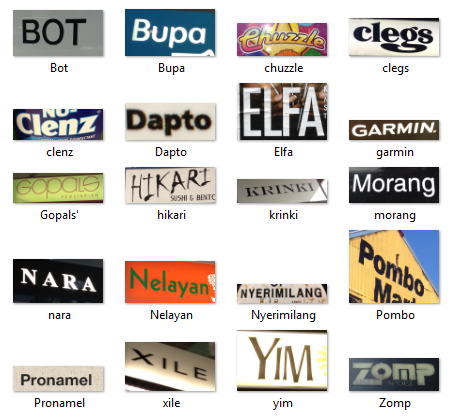
A key criticism leveled at the very sensible use of nonsense words to assess children’s awareness of sounds and spelling pattern knowledge is that they don’t mean anything.
But how true is that?
In the UK all Year 1 children’s reading word attack is now tested via a Phonics Screening Check, so I thought I’d ask Google for definitions of some of its example nonsense words:
Open and closed syllables
86 Replies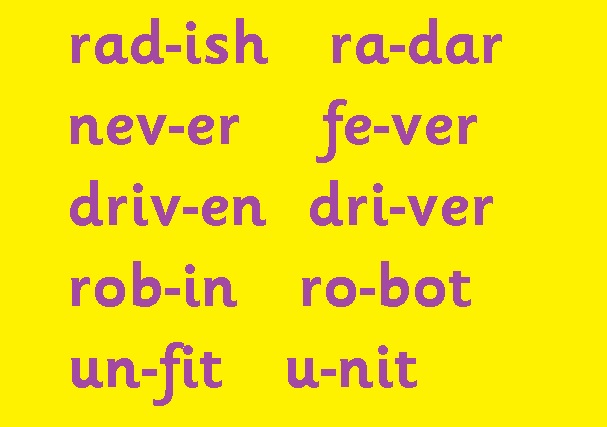
The first syllables in words like “atom”, “centre”, “filter”, “shopping”, “rubbish” and “pullet” contain a “short” vowel, which must be followed by a consonant in English. These are sometimes called “closed” syllables.
The first syllables in words like “paper”, “being” “final”, “hoping”, “brutal” and “future” end with a “long” vowel, and are sometimes called “open” syllables.
Tackling one syllable at a time
When learners start reading and spelling multi-syllable words, it’s useful to get them to practice reading and writing words which contrast “closed” and “open” syllables.
Learning vocabulary
0 Replies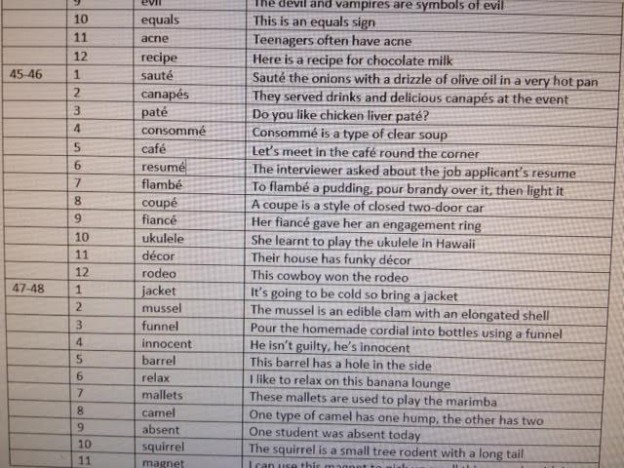
I've just finished (phew!) the parent cheat sheets for all my workbooks. These tell you which word matches each picture, and provide an example sentence illustrating the word's meaning and grammatical function, in case you can't think up a better one yourself.
The cheat sheets now download for free from this site's shop with each workbook (you can look through them all on YouTube here). If you already have a workbook or workbooks and want me to send you the relevant parent cheat sheet(s), just email me.
Having to make up illustrative sentences for all the hundreds of words in the workbooks has really made me think about the books' value in teaching word meaning and use, i.e. vocabulary and grammar, as well as teaching word structure in a systematic way.
Learning vocabulary
Learning all about a new word is a process not an event. Little kids often learn the words "dog" and "duck" fairly early, but at first they call anything with four legs "dog", and all birds "duck".




